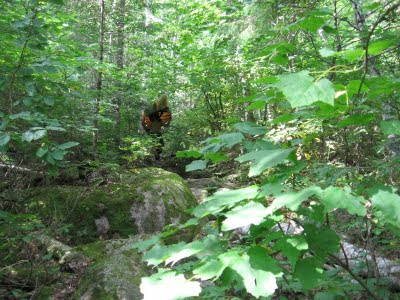 This is a story about a canoe voyage.
This is a story about a canoe voyage.The voyage took place in a Provincial Park, Quetico. Quetico is a wilderness park and is located in a particularly beautiful area of the Canadian Shield in western Ontario. It borders the U.S.'s Boundary Waters. There are no roads, no trails, no electricity, no cabins, no motorboats, no cell phone reception, no rangers, no signage, no logging, few people and plenty of open space, wildlife, lakes and various connecting waterways.
Marty and I first visited in 2004 and knew immediately that we would be back again someday.
That someday came in August 2009.
 The mood was set indeed on our drive in on the last leg of a two-day drive. The clouds overhead were quite 'moody,' dramatic and changing rapidly.
The mood was set indeed on our drive in on the last leg of a two-day drive. The clouds overhead were quite 'moody,' dramatic and changing rapidly.This was to set the tone of our visit. Rapidly changing weather, moody skies and dramatic portages.
Read on.
 For those interested, here is our route:
For those interested, here is our route:Dawson Campground (night 1,)
French Lake, Pickerel Creek, The Pines Pickerel Lake (wind-bound Night 2,)
Pickerel Lake balance, Bisk Lake, Beg Lake, Bud Lake, Fern Lake, Olifaunt Lake, Sturgeon Lake (night 3,)
Sturgeon Lake (wind- and rain-bound Night 4,)
Sturgeon Lake balance, Sturgeon Narrows, big Sturgeon Lake (wind-bound night 5,)
big Sturgeon Lake, Maligne River, Tanner Lake, Maligne River, Maligne Creek, Minn Lake (night 6,)
McAree Lake, Namakan River, Crooked Lake, Little Roland Lake, Middle Roland Lake, Roland Lake, Roland River, Argo Lake (night 7,)
Cone Lake, Brent Lake (wind-bound night 8,)
Unnamed Lake, Conmee Lake, Poobah Lake (night 9,)
Poobah Lake balance, Berniece Lake, Allen Lake, Allen Creek (about face!), Allen Lake (night 10,)
Berniece Lake, Poobah Lake, Poobah Creek, Maligne River, Sturgeon Lake sand point (night 11,)
Sturgeon Lake sand point (wind- and rain-bound all day,) then to Sturgeon Narrows in the evening (night 12,)
Sturgeon Narrows balance, Sturgeon Lake, Olifaunt Lake, Fern Lake, Bud Lake, Beg Lake, Bisk lake, Pickerel lake (windbound night 13,)
Pickerel Lake balance, Pickerel Creek, French Lake, home.
This route included approximately 56 portages. That is 4.5 portages per day, but we made up to 10 portages on some days. Yikes.


























































